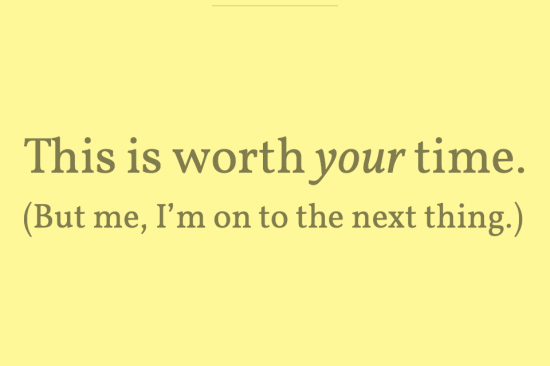What does it mean to like or favorite something on the internet today?
The Backstory
The above is a riff on a line from Robin Sloan’s recent coup d’app, Fish. His tap essay explores the difference between liking something online and actually loving something online. Robin posits that in the overwhelming stream of great posts, articles, pics and videos, something we love on the internet is something come back to, something we read or visit at least twice. Fish is a beautiful essay with a strong point; it’s innovative, well-designed and touching, and I am a big fan.
However, I don’t quite agree with the disparagement of liking, faving (and even +1-ing) that helps form the essay’s underlying thesis. According to Sloan, when you deign to spend a click on one of these actions, (emphasis his):
“You’re saying to your friends or followers: This is worth your time. (But me, I’m on to the next thing.)”
Certainly, the like or fave is a quick and easy way to leave a mark. It takes an instant and not much, if any, critical thought. It’s not the same as writing a blog post or making a reply video in response to whatever caught your eye, and not even as involved as typing in a comment.
The Defense
But is the action meaningless? No. While friends or followers may or may not notice the act, there is one person who most definitely will: the original poster. This is the motivation that drives my starring, liking and +1-ing; to let the creator of the piece know I appreciated it. The small thrill, the rush of adrenaline, that comes from seeing these accolades, however minute, pop up on something you’ve posted is undeniable.
Furthermore, what these small — and nearly effortless — interactions add up to is a new network. This tertiary lattice lays on top of the world wide web like marginalia. Our likes and faves are a uniquely digital form of doodling in the margins of the internet, doodles that can mean even more than underlines or asterisks on a physical page because they have a chance to elicit a response in the author.
I’m looking forward to the album view of the internet Fish has inspired The Atlantic Tech to attempt to create, and I’m certainly going to return to Robin’s tap essay many more times, but I’m not going to feel bad about giving out likes and faves. The torrent of valuable knowledge flowing through the internet is not going to ebb any time soon, and favoriting will continue, creating an outer valence shell of information that may eventually take on characteristics of its own.
